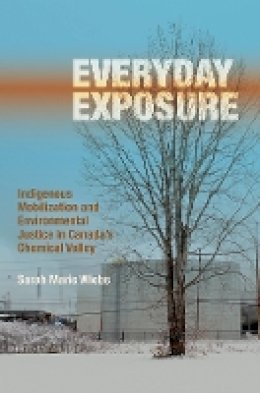
Everyday Exposure: Indigenous Mobilization and Environmental Justice in Canada’s Chemical Valley
Sarah Marie Wiebe
Near the Ontario-Michigan border, Canada’s densest concentration of chemical manufacturing surrounds the Aamjiwnaang First Nation. Living in the polluted heart of Chemical Valley, Indigenous community members express concern about a declining rate of male births in addition to abnormal incidences of miscarriage, asthma, cancer, and cardiovascular and respiratory illnesses.
As this book reveals, Canada’s dark legacy of inflicting harm on Indigenous bodies persists through a system that fails to adequately address health and ecological suffering in First Nations’ communities like Aamjiwnaang.
Everyday Exposure uncovers the systemic injustices faced on a daily basis in Aamjiwnaang. Exploring the problems that Canada’s conflicting levels of jurisdiction pose for the creation of environmental justice policy, analyzing clashes between Indigenous and scientific knowledge, and documenting the experiences of Aamjiwnaang residents as they navigate their toxic environment, this book argues that social and political changes require an experiential and transformative “sensing policy” approach, one that takes the voices of Indigenous citizens seriously.
Product Details
About Sarah Marie Wiebe
Reviews for Everyday Exposure: Indigenous Mobilization and Environmental Justice in Canada’s Chemical Valley
Nadine Hoffman, Natural Resources, Bennett Jones Library, University of Calgary
Canadian Law Library Review (volume 43 No. 3)
Based on extensive time spent in the community learning directly from Aamjiwnaang’s citizens and experiencing the community’s pollution crisis in an embodied and empathetic way, this book is a must-read for anyone who wants to understand the legacies of environmental racism in Canada today.
Warren Cariou is an associate professor of English at the University of Manitoba
Canadian Literature Volume 235, Concepts of Vancouver Special Issue
